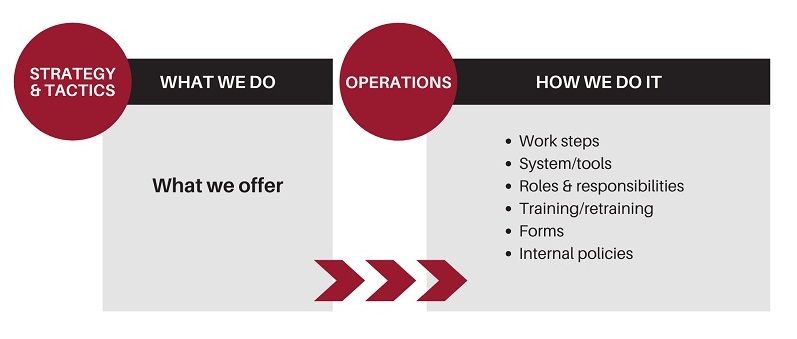Invest in your operations teams to drive your mission forward
Like many sectors, nonprofit and philanthropic organizations have experienced a tidal wave of changes, adjustments, and challenges over the course of the pandemic. The need to direct funding toward efforts to meet emerging community needs, combined with the movement to bolster social justice causes, have highlighted new issues — or perhaps exacerbated existing ones — in operational structure.
Many nonprofits and philanthropies have come under pressure to be more efficient and effective than ever before. The dollars just haven’t been invested to support the kinds of operations needed to carry out such a heightened level of giving in addition to addressing emergency programs. Don’t think about operation teams in a narrow sense; for philanthropic organizations, the nuts and bolts of operations are what enable teams to award and deliver grants quickly, set up and service fund accounts accurately, and work effectively with their boards.

Most philanthropic organizations take pains to carefully design and redesign their mission, strategy, and programs. Yet, few invest time in improving their daily operations to deliver on plans to meet their strategic goals, a step that is essential to making meaningful community impact. Sound planning without excellent execution is unlikely to produce the desired results.
It isn’t enough to add operations teams when they’re needed. Organizations must frame operations as a function and manage it as a process with a defined plan, including giving it the same level of attention and subjecting it to the same rigorous evaluation as efforts to design, monitor, and manage their mission, strategy, and programs.
Improving operations teams and processes has become even more important with the development of emergency programs and social justice funding, which have required an increased level of responsiveness even as the volume of grant applications has significantly increased. For example, one foundation I’ve worked with used to receive thirty applications for each program annually; this same funder now receives a hundred and fifty applications while having to meet a faster turnaround requirement. This makes existing processes and policies impractical. To fulfill the foundation’s mission and achieve its goals, it has become more essential than ever that nonprofit and philanthropic organizations invest significantly in their operations teams.
Skill development and training are table stakes
Operations success requires specific assets and abilities including detail-orientedness to produce desired results, strong project and task management skills, effective problem-solving capacity, and a deep working knowledge of process management and improvement. At the same time, operations teams must have expertise in a wide variety of systems and procedures. Philanthropic tools have gone from a few select systems to a wide array of resources that are vital to each organization. And each year more tools are becoming available.
The first step in enhancing operations expertise is to identify employees with an operations aptitude, then provide them with process management and improvement training. This can involve everything from adapting existing tools and changes in communication to implementing new and improved forms and process changes.
By investing in the skills development of operations teams, organizations can enable employees to transform how work is done, significantly reducing turnaround time and increasing community impact. At the same time, the organization as a whole can gain a better organization-wide understanding of the value of operations work and show renewed appreciation for their teams, which, in turn, can lead to higher satisfaction among core workers.
Invite operations into the C-suite
Being efficient and effective also means greater commitment to scrutinizing how work is done. This includes identifying staff and leadership to focus on monitoring operations outcomes while managing processes and systems, which can involve identifying an operations professional in each major function of the organization.
For example, I’ve seen organizations place an operations manager in their philanthropic services team who works across departments to improve collaboration and communication. Others identify an operations leader who owns and drives finance and operations team planning, project management, and process development.
It is also essential, however, to bring operations into the strategic discussions happening at the executive level. Some organizations I’ve worked with are grouping functions that are highly operational into one leadership role — a chief operations officer — who is responsible for effectively managing the organization’s infrastructure, processes, and resources. I’ve also seen organizations choose to add operations to an existing leader’s role, often the CFO. Elevating operations to the executive level will help ensure that the necessary process and system conversations are included in the design and redesign of an organization’s mission, strategy, and programs.
Ongoing coaching and training for an ever-changing environment
Investing in operational excellence is not just a one-time prospect. As organizations, technologies, and the needs of communities evolve over time, providing ongoing training and coaching to teams and leaders is necessary if an organization is to continue delivering positive impact effectively. Building process muscle and capacity can help organizations consistently raise more money and make more grants on a year-over-year basis without dramatic increases in their budgets. Creating a culture and structure that supports ongoing training and process improvement also helps employees feel more confident and pursue solutions.
Operations staff may feel second-class compared with their counterparts in a structure that excludes them from mission and strategy design. Conversely, if organizations invest in these teams, they feel empowered to take initiative on behalf of the organization.
Making a positive community impact is possible only when effective operational practices are in place. Foundations need to build their operations capabilities and accountabilities, which will enable them to focus on both planning and operations. By moving the conversation beyond mission, strategy, and programs to the details of how the work gets done, organizations find creative ways to maximize their resources and help them support their communities efficiently and effectively.






